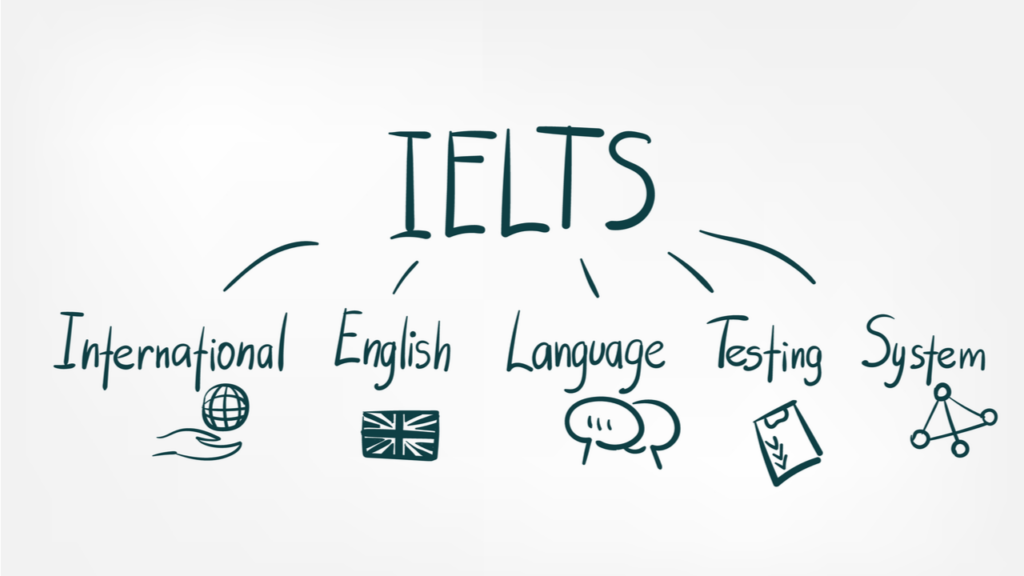Non-native English speakers looking to work, study, or migrate to an English-speaking country need to take the IELTS exam to prove their English proficiency. Many aspiring candidates who want to take this exam have a common question that goes like this – Is IELTS easy? Apart from this, several candidates are confused about the difficulty level of this examination.
The straightforward answer to these questions are – it depends! To understand, is IELTS easy or difficult, candidates need to assess their command of English. The IELTS exam is accepted by over 11,000 universities, schools, and employers worldwide, making it one of the most renowned English exams. The following sections contain a detailed overview of all the sections of IELTS and how to tackle their difficulty. In addition, we have also added a comparison between the difficulty of IELTS academic and general training.

Different Sections of the IELTS Exam
Every test is tough if candidates are unprepared. So, one needs to be well-versed in the various sections of the IELTS exam, namely:
1. Listening Test
The listening test is for 30 minutes. In addition, an extra 10 minutes is given to candidates to transfer their answers to the answer sheet. The listening test consists of four sections:
Crack IELTS Exam in first attempt
Attend Leap’s free masterclass to get tips, tricks and advance strategies to crack IELTS exam in first attempt

- Section 1 – A conversation set in an everyday context between two individuals
- Section 2 – A monologue in an everyday context
- Section 3 – A conversation in an educational context with up to 4 people
- Section 4 – A monologue on an academic subject
2. Reading Test
The reading test contains 40 questions and is completed in 60 minutes. This section entails a variety of questions to evaluate the reading capacity of an individual. Further, the test format for this section is different for IELTS academic and IELTS general training.
Crack IELTS Exam in first attempt

Attend Leap’s free masterclass to get tips, tricks and advance strategies to crack IELTS exam in first attempt
- IELTS Academic Reading Test
In the academic test, the examiner provides three long texts to the candidates. These texts range from analytical and discursive to factual and descriptive. These texts are authentically taken from several magazines, newspapers, books, etc.
- IELTS Academic Reading Test
The general training reading test contains three passages along with tasks. The texts are taken from various books, magazines, newspapers, etc.
3. Writing Test
The wiring section in IELTS takes 60 minutes to complete. Again, this section is different in IELTS general training and IELTS academic.
- IELTS Academic Writing Test
The academic writing test contains two tasks:
Task 1 – Candidates are given tables, charts, graphs, etc., and then they are asked to provide a description of the information.
Task 2 – Candidates are asked to write an essay relating to a discussion, point of view, or a problem.
- IELTS General Writing Test
The general writing test comprises topics of general interest. This section contains two tasks, including:
Task 1 – A candidate will be given a situation and then be asked to write a letter to the authority asking for an explanation or any information.
Task 2 – Writing an essay relating to a problem, argument, or point of view. Here, candidates can write the essay in a personal way.
4. Speaking Test
The speaking test broadly takes 11-14 minutes and assesses a candidate’s use of spoken English. This section contains three tasks:
- Task 1 – One is asked to answer general questions about a range of familiar topics like hometown, family, friends, hobbies, etc.
- Task 2 – Candidates are given a card, and then they are asked to speak about a particular topic. Examiner will then ask a few questions to end this part.
- Task 3 – Further questions are asked in connection to task 2. This provides the candidates with more opportunities to explain their ideas and issues.
Moreover, the speaking section is designed peculiarly, such that candidates do not get enough time to rehearse before responding.
Is IELTS Easy: Factors to Make IELTS Easier
For candidates wondering – Is IELTS easy? Here are a few factors that might affect the difficulty level of this exam:
- British English Fluency
Interestingly, IELTS presents itself as a standardized examination that accepts global English. However, most passages in this exam are written in British English. Also, during the listening section, the audio track will certainly have one British speaker. So, to be on the safe side, candidates must prepare themselves according to the standards of British English and gain fluency in the accent.
- Ease in Writing Letters and Everyday English
Candidates appearing for the general training test may also want to brush up on their letter writing skills. They must practice both letter writing formats, formal and informal.
- Awareness of Charts, Graphs, and Tables
A major section of the IELTS exam also demands visual literacy. Candidates must know how to read charts, graphs, tables, etc., with ease. Provided a candidate is familiar with these things, this exam may become easier.Apart from knowing the factors that can make IELTS easier, candidates must also follow a few ways to tackle the difficulty of the various sections of this exam. Mentioned below is a detailed description of handling this exam’s difficulty level that will answer the question – Is IELTS easy?
Is IELTS Easy: Ways to Tackle Different Sections
Students often stay in oblivion, trying to figure out the difficulty level of the IELTS exam. Now, the question is- Is IELTS easy? The answer to this is yes, with practice, the correct guidance and resources.
Ways to Tackle a Difficult Reading Section in IELTS
The reading section has a time restriction of one hour, and candidates must answer 40 questions within this time limit while reading around 2,000 words.Here are a few ways to tackle a difficult reading section:
- Read materials of any type, be it academic, general, or internet substance.
- Participants must try to engulf the content within the time limit
- If there is difficulty understanding a word, one should imagine the word in different scenarios and then comprehend the meaning.
Ways to Tackle a Difficult Speaking Section in IELTS
A lot of participants often ponder – is IELTS easy or difficult? In the speaking section, the examiner provides a task card to the candidates, on which they have to speak for two minutes. One of the most common mistakes that candidates make in this section is repeating the same tale repeatedly. Moreover, a greater mistake is concluding the actual story in about 50 seconds and then repeating the same material.To solve this, one can employ past, present, and future strategies. Using this strategy, the candidates should easily tell three different stories as per the assignment card.
Ways to Tackle a Difficult Writing Section in IELTS
As you must know, the writing section is different in IELTS academic and general training. We will discuss both these tests here.
1. Whether Writing Section in IELTS Academic Tough
While writing for IELTS academic, candidates must remember not to fall short of the required word count. Many candidates fail to maintain a word count of 250. One may lose the entire band point if such a mistake is made.To prepare for the writing section in IELTS academic, keep the following points in mind:
- Outlining the ideas and then writing the essay according to that
- Search the internet for sample essays to get an idea about the type of questions in this test.
- Write at least 150 words for task 1 and 250 words for task 2
- Do not use any complicated words if you are unaware of their meaning
2. Is Writing Section in IELTS General Training Tough
The major critical approach of general training writing assessment criteria is coherence. In this section, candidates must comprehend the primary topic and follow these points:
- The word count in this part is important. Candidates must remember not to exceed the word limit. Otherwise, they will lose raw points.
- Prioritizing quality over quantity
- Improve writing speed by practising over QWERTY keyboards
- Finally, proper time management is a crucial aspect that will determine the overall band score.
3. Tackle a Difficult Listening Section in IELTS
Candidates must be familiar with the kind of questions in the listening part of this test. This is because the examiner will not provide enough time to comprehend the questions. However, this exam is conducted in a quiet area, which will help you concentrate in a better way.
Is IELTS Easy: IELTS General vs Academic
There is not much difference in difficulty between IELTS academic and general training. It is advisable that candidates prepare equally for both instead of wondering – Is IELTS easy or not? The listening and speaking tests are identical for both these exams. However, the reading and writing sections are different. Moreover, the time for both these exams is the same, and the number of questions also remains the same. In addition, there is no shortcut to preparing for these exams. Candidates must put in equal effort and assess their degree of comprehension. The main distinction between these exams is that, in the general training, candidates need to show their working knowledge of English. In the academic test, the examiner evaluates a candidate’s ability to explain complicated ideas.Depending upon the test structure, the general training exam is a bit simpler. In addition to this, the scoring methodology is also different in both these exams’ reading sections.A 37-38 out of a raw score of 40 will provide a candidate with an 8 band score in academic reading. On the other hand, in general training, a score of 37-38 out of a 40 raw score will provide a candidate with an 8.5 band score.
Tips to Improve Your IELTS Score
Here are a few tips and tricks that will help candidates improve their IELTS scores:
1. Know the Assessment Criteria
The examiner ranks candidates based on a few assessment criteria. Candidates must understand those beforehand. This will provide an individual with a detailed understanding of the required skills he/she needs to showcase in the exam.
2. Improve Your Grammar
Accurate grammar is crucial to make the statement understandable to the examiner. Moreover, the utilization of appropriate grammar will lead to an improved IELTS score. So, candidates should use proper grammar to boost their confidence and make their score a notch above the rest.
3. Preparing a Study Plan
Students must craft an effective study plan, one that meets their comfort and needs. This plan will help them go through a detailed IELTS preparation.
4. Vocabulary Enhancement
Candidates must try to learn at least 10 new words a day. However, in addition to learning these words, they should also know their meaning. Using appropriate words to showcase your talents will strike the examiner and help in achieving an improved score.
5. Practice
The most important success mantra for IELTS aspirants should be practice, practice, and practice. Candidates should download resources from the internet and look at sample questions to solve them and polish their English language skills.

When people ask – Is IELTS easy? They also struggle with knowing the answer to the question – how difficult is it to get a good band score in IELTS? The answer to this question is quite simple. The difficulty of an examination entirely depends upon a candidate’s goals and needs. If a candidate shows extreme determination and practices regularly, it would be easy for them to get a good IELTS score. Moreover, candidates determined to migrate to an English speaking country may sometimes look for funding options. We at Leap Scholar, understand the complexity of moving to an entirely new nation and don’t want you to let go of your dreams due to the rising cost of studying abroad.Leap Scholar encourages students at every step by providing low-interest and no collateral education loans. So, go chase your dreams while we handle the stress.
Frequently Asked Questions
-
Which month of the IELTS exam is easy?
The questions for the exam tend to change every few months. So, there is no definitive answer to which month would be the easiest. However, it is advisable that candidates retake the exam only after a few months, with thorough preparation to score better.
-
Can I get a 9 in IELTS?
It is not impossible, but it takes tremendous practice. Strong determination and devotion toward IELTS preparation can surely help you ace the test.
-
Which is the best month for IELTS?
The examination board adds the speaking topics are generally during January, September, and May. Therefore, the best time to take this exam would be before the questions change, meaning in the months of August, April, and December. During this time, the candidate will be aware of most of the topics, which will help in scoring a better band.
-
What things are to be done at the test centre on the assigned IELTS exam dates in India?
An original ID and stationery with pens and pencils are required of the candidate before they enter the testing facility.
-
Can you find IELTS exam dates all year long?
Yes, the IELTS exam is offered all year long. You have plenty of time to choose a date in advance.
-
Can you choose the IELTS exam site of your choice?
Registering at least a month beforehand is the only method to guarantee a preferred IELTS exam centre.
-
How many times can you give the IELTS exam?
There is no limit set by the conducting bodies of IELTS for taking the IELTS exam. You can take the IELTS test as often as possible until you get your dream/target score. However, you have to pay the IELTS test fee for every attempt.






